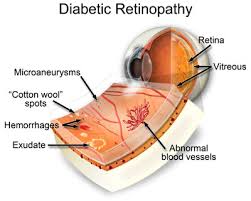- Home
- Editorial
- News
- Practice Guidelines
- Anesthesiology Guidelines
- Cancer Guidelines
- Cardiac Sciences Guidelines
- Critical Care Guidelines
- Dentistry Guidelines
- Dermatology Guidelines
- Diabetes and Endo Guidelines
- Diagnostics Guidelines
- ENT Guidelines
- Featured Practice Guidelines
- Gastroenterology Guidelines
- Geriatrics Guidelines
- Medicine Guidelines
- Nephrology Guidelines
- Neurosciences Guidelines
- Obs and Gynae Guidelines
- Ophthalmology Guidelines
- Orthopaedics Guidelines
- Paediatrics Guidelines
- Psychiatry Guidelines
- Pulmonology Guidelines
- Radiology Guidelines
- Surgery Guidelines
- Urology Guidelines
Tight diabetes control cuts diabetes Retinopathy risk by half- ACCORD Trial Eye Study

Washington D.C : You can protect your vision from the effects of diabetes by intensively controlling your blood sugar level, according to a recent study.
People with type 2 diabetes, who intensively controlled their blood sugar level during the landmark Action to Control Cardiovascular Risk in Diabetes (ACCORD) Trial Eye Study, were found to have cut their risk of diabetic retinopathy in half in a follow-up analysis conducted four years after stopping intensive therapy.
Lead author Emily Chew said that this study sends a powerful message to people with type 2 diabetes who worry about losing vision and added that well-controlled glycemia or blood sugar level has a positive, measurable, and lasting effect on eye health.
Tight control successfully reduced glycemia to an average 6.4-percent A1C, a measure of average blood glucose, compared to 7.7 percent among participants on standard glycemic control therapy.
Although it failed to reduce cardiovascular disease risk, such as heart attack and stroke, the researchers found that the therapy had cut retinopathy progression by about one-third by the end of ACCORD.
Results also point to a possible role for ongoing use of fenofibrate to treat diabetic retinopathy, if taken regularly. Based on ACCORD findings, fenofibrate might be worth taking to control diabetic retinopathy progression. Other countries, including Australia, have approved fenofibrate for treating diabetic retinopathy but not the U.S., said Chew.
The study appears in the journal Diabetes Care.

Disclaimer: This site is primarily intended for healthcare professionals. Any content/information on this website does not replace the advice of medical and/or health professionals and should not be construed as medical/diagnostic advice/endorsement or prescription. Use of this site is subject to our terms of use, privacy policy, advertisement policy. © 2020 Minerva Medical Treatment Pvt Ltd